What’s happening to democracy in Melanesia?
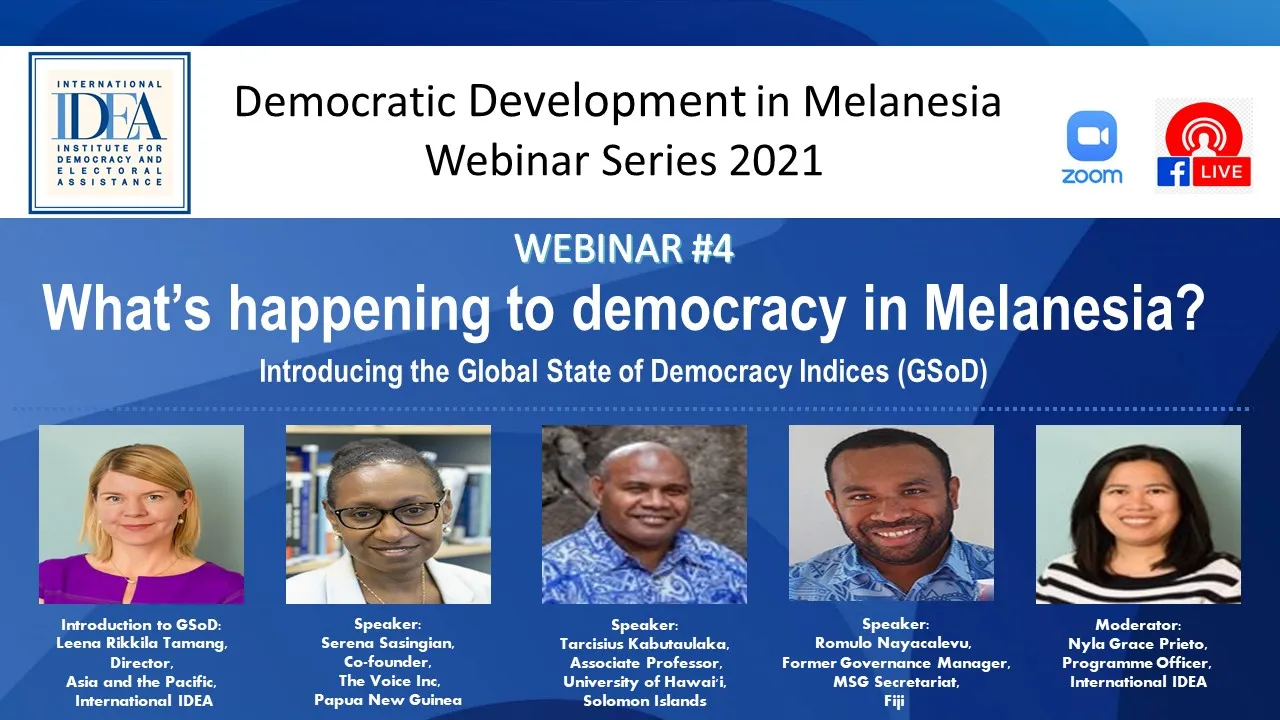
The fourth webinar , held on 29 July 2021, answers the question: “What’s happening to democracy in Melanesia?
The webinar, moderated by Nyla Grace Prieto, Programme Officer at International IDEA’s Asia and the Pacific Regional Programme, was intended to acknowledge and investigate addition of two more Melanesian countries, Fiji and Solomon Islands, in the updated Global State of Democracy (GSoD) Indices. Leena Rikkilä Tamang, Regional Director for Asia and the Pacific, explained the Global State of Democracy framework used by International IDEA to measure democracy. The data span for 45 years from 1975 to 2020 covering 165 countries. Tamang revealed that Solomon Islands and Fiji were only added in 2020 because countries with populations under one million people have by default been excluded from the Indices. Another reason for the late inclusion was availability and accuracy of the necessary data. The Asia and the Pacific Regional Office successfully sought the inclusion of those two Melanesian countries after verifying the available data. There are plans to continue including more Pacific nations into the database in the coming years.
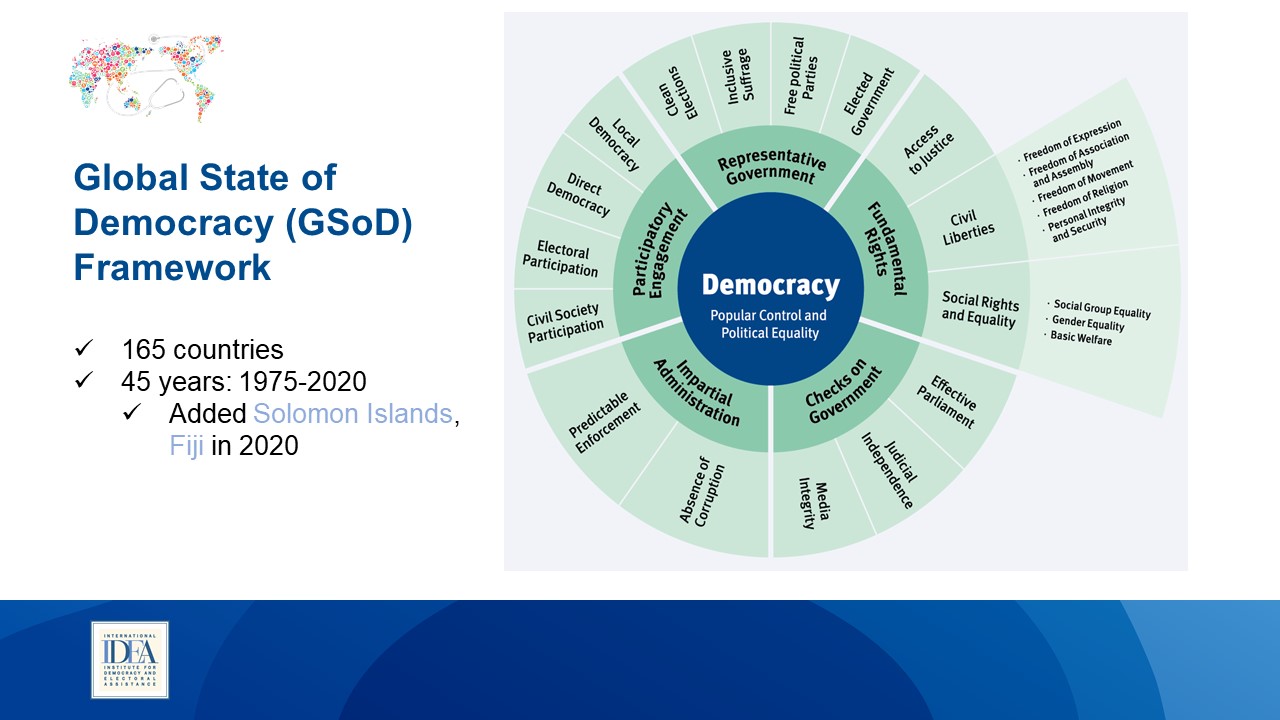
The overall aim of the GSoD is to provide a nuanced picture of a country’s state of democracy while recognising that a country may do well in some respects and less well in others. After showing how one can access interactive data from the website, Tamang presented to the participants country profiles for Fiji, Papua New Guinea, and Solomon Islands. These countries are currently classified as low performing democracies. A common trend shown was that all three countries had low performance in the Participatory Engagement Attribute and Social Rights and Equalities sub-attribute. The three speakers addressed some of the pressing issues affecting democracy in their country following the introductory presentation by Tamang.
State of Democracy in Fiji
Reflecting on Fiji, Romulo Nayacalevu, a human rights lawyer, and former Governance Manager at Melanesian Spearhead Group Secretariat, gave his opinion on the data that was presented and emphasised that the Indices is a valuable tool to assess the progress of Pacific states individually and collectively as a region. Nayacalevu adds that the comparative aspect of the indices enables countries to measure their progress with other similar states in the pacific and across the world to see how they fare towards creating a more democratic society. Nayacalevu hopes that “the indices will guide policy and lawmakers, practitioners, diplomats, academics, students, political commentators, donor communities and governance enthusiasts on measurable outcomes and areas that need to be improved to ensure solid governance practices within our states and region.”
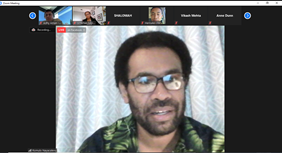
at Melanesian Spearhead Group Secretariat
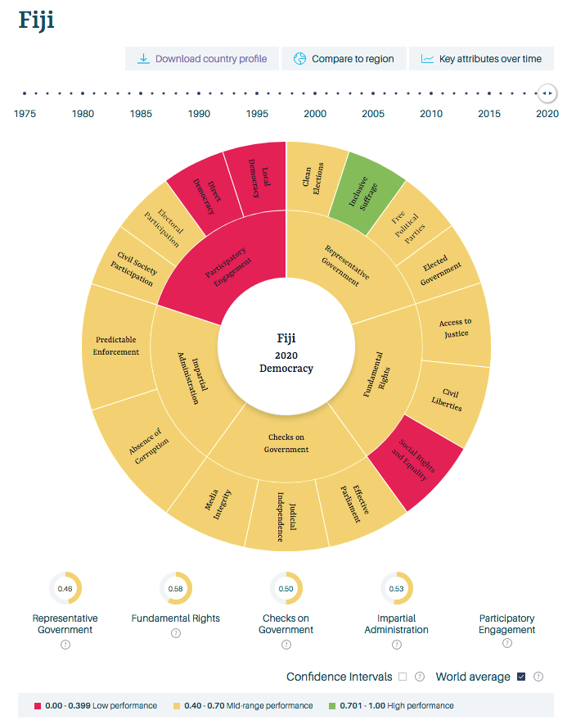
Source: The Global State of Democracy initiative Fiji ,
Fiji is considered a weak democracy in the GSoD tables and basing his comment on the data on Representative Government Attribute, from 1975 to 1987, the indicators showed a steady growth trend of 0.5 on the upper scale and because of the 1987 coup, the performance got low and then it picked up in 1992 till 2000 when another coup happened. Romulo explained how Fiji’s performance has been affected by political instability, volatility and uncertainty which are all linked. He said that national decisions are made in the name of human security, but at the cost of basic human rights and freedom as Fiji continues to confront and navigate challenging times brought by the evolving legal order, which is now worsened by a raging pandemic that continues to pose a threat. Romulo further added that Fiji’s 2013 Constitution has provisions that protect socio-economic and cultural rights as well as civil and political rights since Fiji is the only Pacific Island country that has ratified all nine international core human rights conventions.
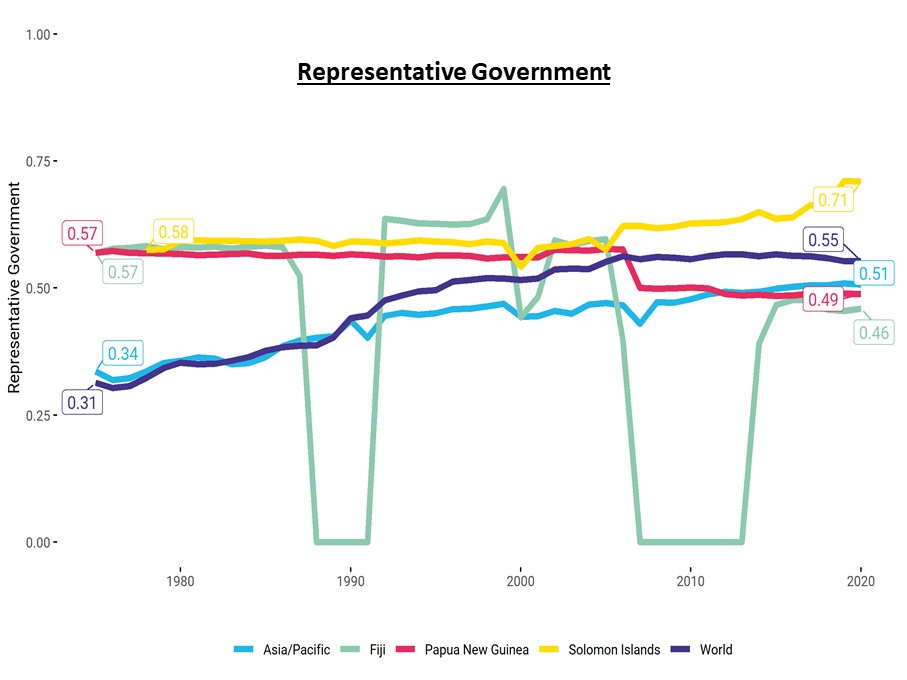
with the Asia and the Pacific region as a whole, and the entire world. Source: International IDEA’s GSOD Indices website.
Romulo contends that for any improvement in the country’s governance indicators, decision-makers and the citizenry need to consider how they can actively and openly engage each other on all matters that affect both the governed and the government. While presenting his outlook for 2021, Romulo thinks the trend may show a decline or “democratic backsliding” should the Covid-19 responses continue to be in state of flux.
Jagath Karunaratne of the Freedom Alliance Party asked if it was important to include pacific nations’ traditional and religious structures of governance in the democratic governance model since in some cases traditional and religious structures have been pushed away with the accusation that they are politicised. In response, Romulo asserted that religious and traditional forms of governance (which was functioning) need to be encouraged and needs to find their synergy with western political democracy or the democratic process itself. He further explained that politics is the representative will of the people, it is worth considering that the people in the pacific are religious and traditional and these identities need to be complimented in the democratic governance system so people in the Pacific takes ownership of democracy.
State of Democracy in Papua New Guinea
The speaker from Papua New Guinea, Serena Sasingian, a member of International IDEA’s Board of Advisers, International IDEA and co-founder of The Voice Inc., a civil society organization that works on youth development said that PNG falls in the mid-range performance as per the data even though PNG has kept an unbroken record in democratic governance since 1975 with regular national elections, independence of the judicial system as well as the media’s and citizens’ freedom to criticize the government. Reflecting on the data that shows PNG’s low performance in the impartial administration attribute, Sasingian linked that to the elevated level of corruption that grapples the country. Sasingian explained that in PNG’s case, the democratization process did not eventuate like it did in other countries where it started with tribes, then kingdoms, followed by the democratic governance. PNG, on the other hand, entered democratic governance straight from tribalism, hence there was not any centralised authority. As a consequence, the state is now struggling to exert its authority, to develop its capabilities and to build legitimacy across the board.
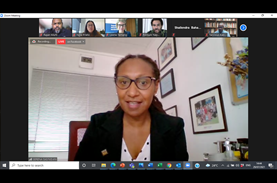
International IDEA and co-founder of The Voice Inc.
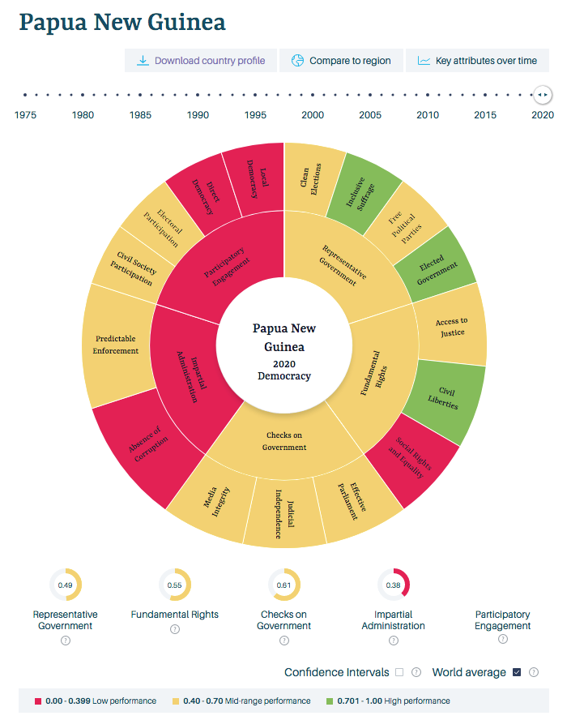
Source: The Global State of Democracy initiative.
Having lived in this transitional period of democracy in PNG, Sasingian emphasised that the data published in the 2020 GSoD indices will help them look at the trend that democracy in PNG has taken. She further added that since 1975, the democratic trends in PNG have dropped but not significantly. This means PNG is experiencing a gradual democratic decline. Looking at the GSoD data, in the Representative Government attribute, Serena believes that PNG’s data is quite correct since from 1975 there have been clean elections and elected governments. In terms of the Fundamental Rights attribute, Sasingian said that PNG has done well in terms of the constitution but has struggled in terms of actual enforcement of those rights, access to justice and civil liberties. Sasingian explained that because of the low literacy rate, a lot of misinformation is out there. With the lack of trust in the government due to an elevated level of corruption, the government finds it hard to ensure people are adhering to the controls in place. Another area of concern highlighted by Sasingian was Gender Equality. There are zero women in the parliament right now (there has never been more than three at a time) and the rate of violence against women and children is extremely high.
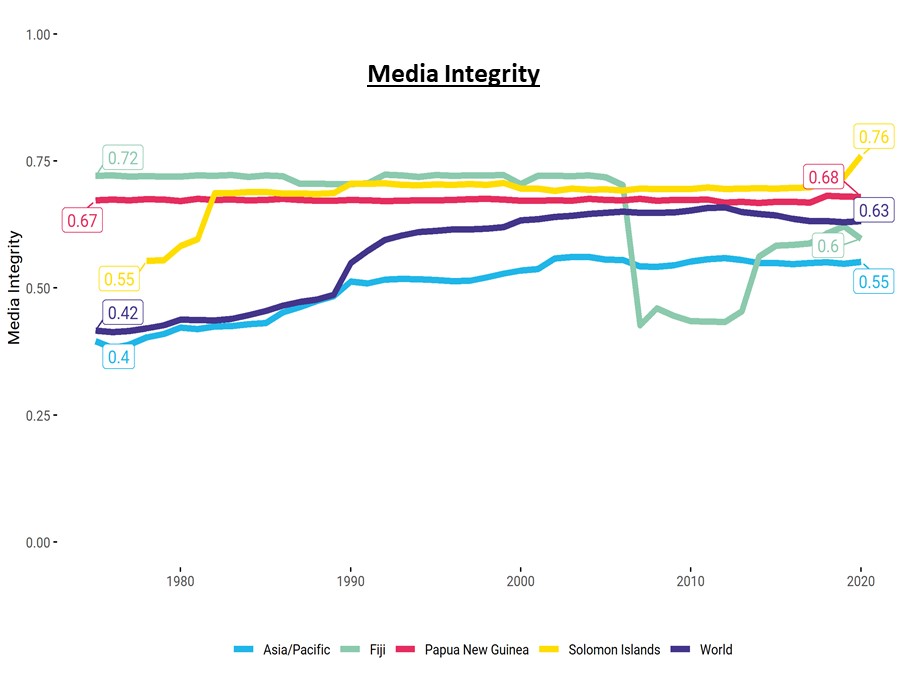
Melanesian countries with the Asia and the Pacific region as a whole, and the entire world.
Source: International IDEA’s GSOD Indices website.
While talking about challenges and opportunities for democracy in PNG, Serena said that the Covid-19 crisis like in other countries poses a threat to democracy. The parliament in PNG has been adjourned since April 2021 citing rising Covid-19 infections, but there were talks of a Vote of No Confidence against the government at the time. With the elections due in 2022, there has not been a census conducted for over 10 years, which will be a challenge for the elections, particularly in relation to the integrity of the voter registry. With the government passing laws to protect whistle-blowers and setting up of Independent Commission Against Corruption, PNG is on track to improve in the Checks on Government attribute.
The moderator, Nyla Prieto, asked Sasingian for her thoughts on how PNG can address the issue of women representation in parliament. In her reply, Sasingian informed that there are now laws that have temporary special measures in place, which will enable women to enter parliament and become part of the decision-making process. Serena said that she is in “support of the temporary special measures” that are being implemented which will bring the diversity of different views in parliament for debate and it will help in the improvement of the country.
State of Democracy in Solomon Islands
Associate Professor Tarcisius Kabutaulaka, Director for Pacific Islands Studies at the University of Hawaii, thanked International IDEA for the attributes and said that he finds them useful and reflecting not only on Solomon Islands but also the rest of the Pacific and the rest of the world. In his commentary on the data available for Solomon Islands, Prof. Kabutaulaka highlighted that the country is doing well in terms of Representative Government attribute where the voter turnout has always been high. Kabutaulaka explains that some people take part in the electoral process only because they think they can benefit in some ways directly or through the candidates if elected and if that is the case then it raises the question that electoral participation does not always measure democracy or is not what we always think what it is when we see high election participation particularly in the case of Solomon Islands. Solomon Islands performance in the Fundamental Rights attribute is not very well and according to the Professor, Access to Justice is often complicated and expensive when you look at the remoteness of people from these facilities. Social Rights and Equity has also not performed well according to Kabutaulaka, and the low performance is because of the State of Emergency that Solomon Islands has declared since the pandemic began.
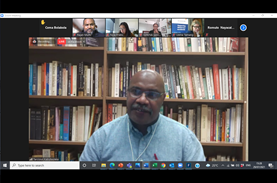
Director for Pacific Islands Studies at the University of Hawaii.
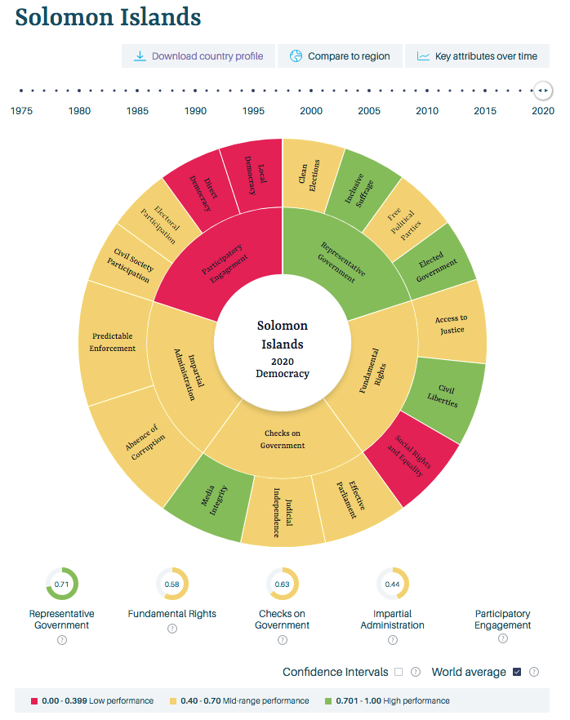
(Source: The Global State of Democracy initiative (idea.int))
Impartial Administration is an attribute where Solomon Islands is not faring well, and the Professor explained that corruption is the biggest contributor. He further adds that the politicization of every aspect of Solomon Islands institution fuel corruption and raises questions on public service delivery. In 2018, Solomon Islands implemented Anti-corruption Act, but this act is now under review as the Governor said that it did not work in the way it was supposed to. The Solomon Islands scored high in terms of media integrity under the Checks on Government attribute, but the Professor emphasized that the quality of media reporting needs to be equally considered. In the case of Solomon Islands, the quality needs improvement. The quality of media was agreed by the Head of School of Journalism at the University of the South Pacific, Dr Shailendra Bahadur Singh who said that media freedom is a two-way thing - the freedoms enjoyed by the media on one hand, and the quality/capacity of media on the other.
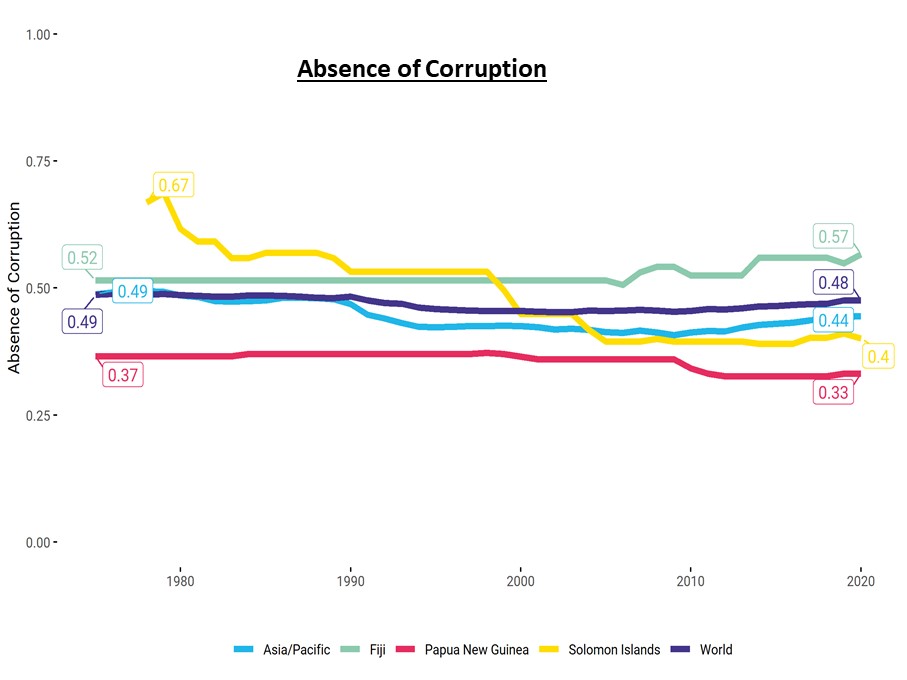
Melanesian countries with the Asia and the Pacific region as a whole, and the entire world.
Source: International IDEA’s GSOD Indices website.
Sheldon Chanel, a freelance journalist based in Fiji asked how big of a concern is social media in relation to democracy and if it is worth looking at The Professor explained that social media is useful as it supplies a platform for engagements, dialogue on a range of issues and is used by the government to spread information especially during the pandemic but social media is also misused by people which was clear during the pandemic. He went on to suggest that people should embrace social media, but there should be plans in place to prepare our people on how to use the platform responsibly. The Professor said that having social media usage in the school curriculum will not only make the future generation technological literate but technological responsible.
The state of Democracy in Melanesia in 2021 and beyond(?)
The speakers in their outlook for 2021 think that there may well be a decline in the rating for their respective countries. A major contributor to that would be the pandemic--therefore, it is important to recognise that if the pandemic persists, more efforts must be made to check and track the state of governance. With general elections on the horizon, it will be important for these countries to respond appropriately to ensure that democracy is upheld.
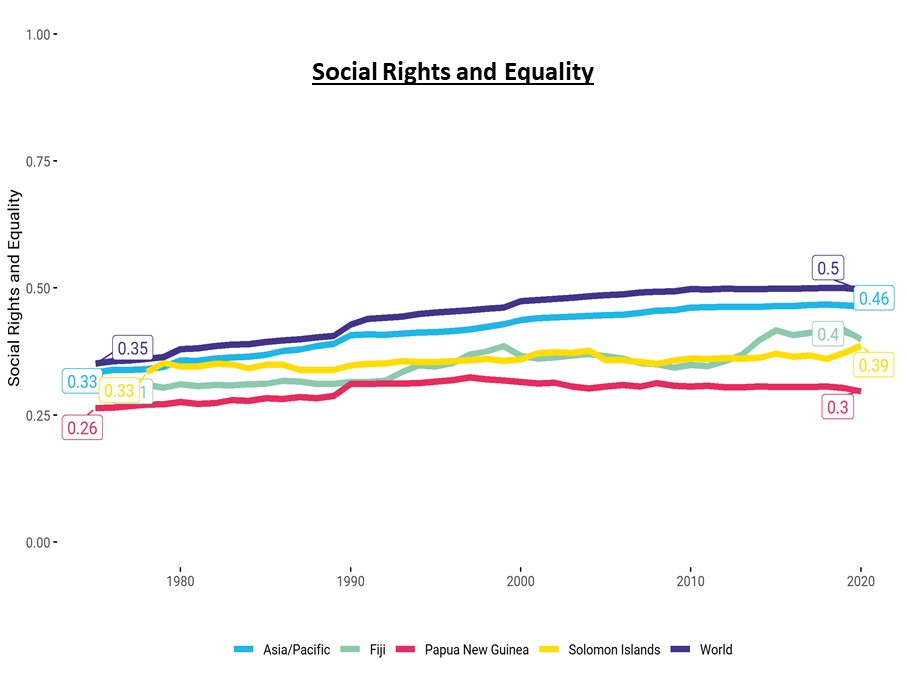
Asia and the Pacific region as a whole, and the entire world. Source: International IDEA’s GSOD Indices website.
One area where all the three countries are performing below Asia & the Pacific and World averages is Social Rights and Equality as seen in the graph above. International IDEA encourages nations to keep an eye on their democratic development as it has a correlation to achieving the sustainable development goals. The GSoD indices is one of many tools that can be used for the monitoring.
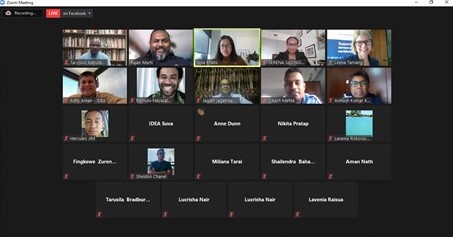
The webinar had other interesting discussions which can be viewed on the International IDEA Facebook page. Follow us on Facebook to learn about upcoming webinars in the Melanesian series.





